BSc Hons BMP6018: Financial Accounting & Reporting Framework
VerifiedAdded on 2023/06/16
|8
|3283
|438
Essay
AI Summary
This essay provides a comprehensive analysis of the financial accounting and reporting framework, focusing on fundamental accounting concepts and conventions and their impact on financial statements and users. It discusses the history of accounting regulations, reasons for constant changes, and the differences between accounting rules and principles. The essay elaborates on the importance of financial accounting concepts such as accrual, matching, and economic entity, as well as accounting conventions like conservatism, consistency, and full disclosure, detailing their impact on financial statements and the information available to financial statement users. This document is available on Desklib, a platform offering a wide array of study resources for students.
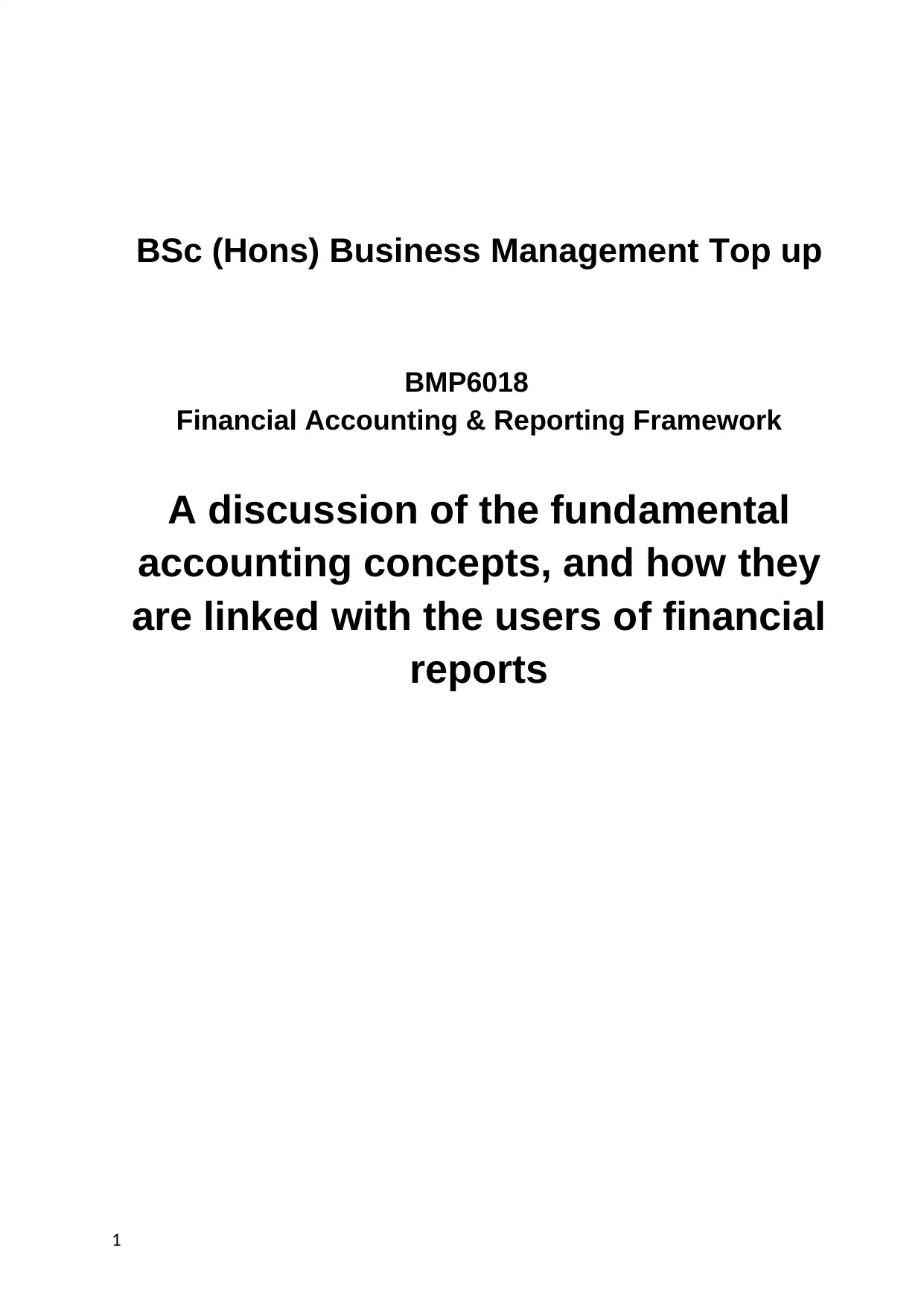
BSc (Hons) Business Management Top up
BMP6018
Financial Accounting & Reporting Framework
A discussion of the fundamental
accounting concepts, and how they
are linked with the users of financial
reports
1
BMP6018
Financial Accounting & Reporting Framework
A discussion of the fundamental
accounting concepts, and how they
are linked with the users of financial
reports
1
Paraphrase This Document
Need a fresh take? Get an instant paraphrase of this document with our AI Paraphraser
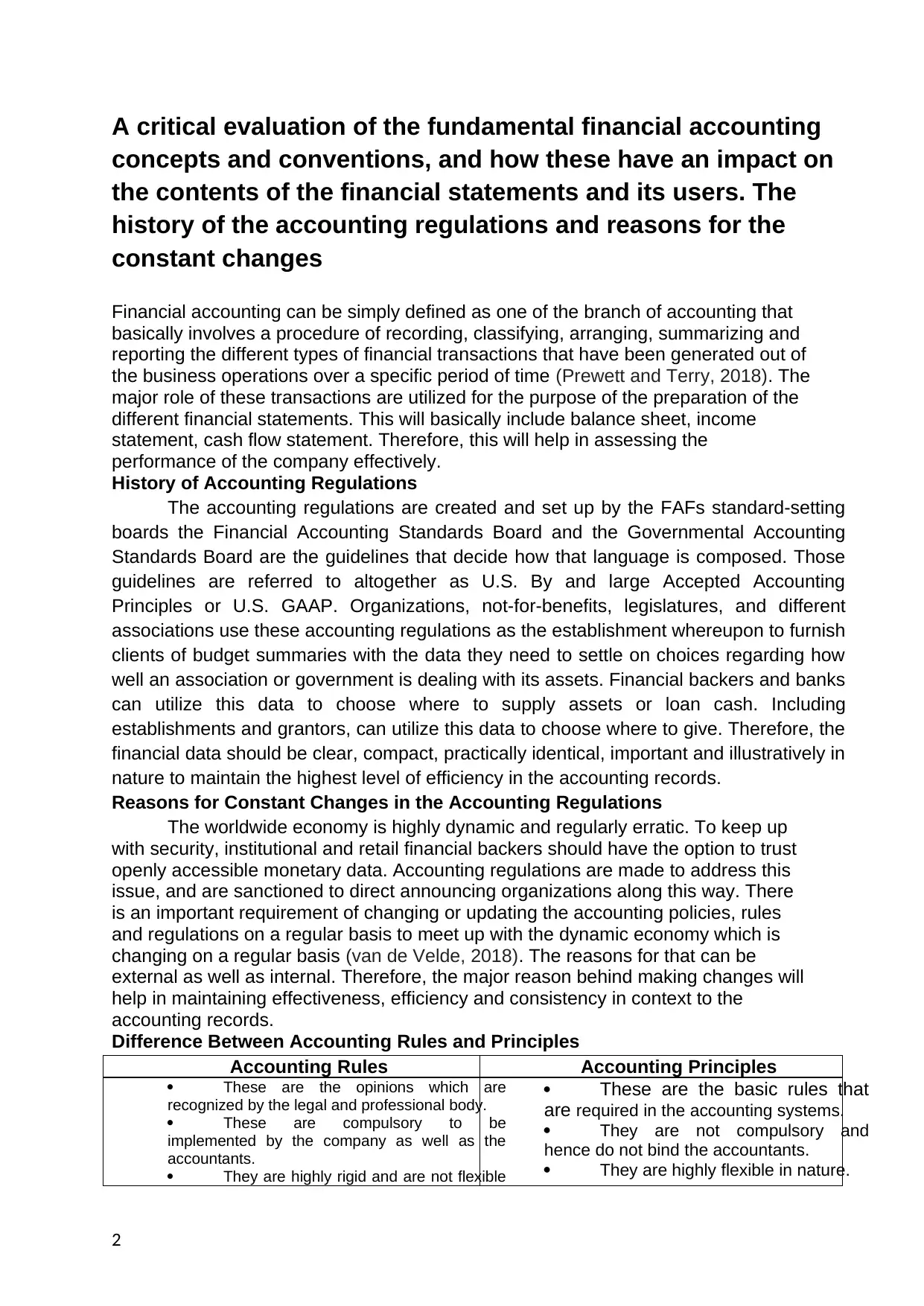
A critical evaluation of the fundamental financial accounting
concepts and conventions, and how these have an impact on
the contents of the financial statements and its users. The
history of the accounting regulations and reasons for the
constant changes
Financial accounting can be simply defined as one of the branch of accounting that
basically involves a procedure of recording, classifying, arranging, summarizing and
reporting the different types of financial transactions that have been generated out of
the business operations over a specific period of time (Prewett and Terry, 2018). The
major role of these transactions are utilized for the purpose of the preparation of the
different financial statements. This will basically include balance sheet, income
statement, cash flow statement. Therefore, this will help in assessing the
performance of the company effectively.
History of Accounting Regulations
The accounting regulations are created and set up by the FAFs standard-setting
boards the Financial Accounting Standards Board and the Governmental Accounting
Standards Board are the guidelines that decide how that language is composed. Those
guidelines are referred to altogether as U.S. By and large Accepted Accounting
Principles or U.S. GAAP. Organizations, not-for-benefits, legislatures, and different
associations use these accounting regulations as the establishment whereupon to furnish
clients of budget summaries with the data they need to settle on choices regarding how
well an association or government is dealing with its assets. Financial backers and banks
can utilize this data to choose where to supply assets or loan cash. Including
establishments and grantors, can utilize this data to choose where to give. Therefore, the
financial data should be clear, compact, practically identical, important and illustratively in
nature to maintain the highest level of efficiency in the accounting records.
Reasons for Constant Changes in the Accounting Regulations
The worldwide economy is highly dynamic and regularly erratic. To keep up
with security, institutional and retail financial backers should have the option to trust
openly accessible monetary data. Accounting regulations are made to address this
issue, and are sanctioned to direct announcing organizations along this way. There
is an important requirement of changing or updating the accounting policies, rules
and regulations on a regular basis to meet up with the dynamic economy which is
changing on a regular basis (van de Velde, 2018). The reasons for that can be
external as well as internal. Therefore, the major reason behind making changes will
help in maintaining effectiveness, efficiency and consistency in context to the
accounting records.
Difference Between Accounting Rules and Principles
Accounting Rules Accounting Principles
These are the opinions which are
recognized by the legal and professional body.
These are compulsory to be
implemented by the company as well as the
accountants.
They are highly rigid and are not flexible
These are the basic rules that
are required in the accounting systems.
They are not compulsory and
hence do not bind the accountants.
They are highly flexible in nature.
2
concepts and conventions, and how these have an impact on
the contents of the financial statements and its users. The
history of the accounting regulations and reasons for the
constant changes
Financial accounting can be simply defined as one of the branch of accounting that
basically involves a procedure of recording, classifying, arranging, summarizing and
reporting the different types of financial transactions that have been generated out of
the business operations over a specific period of time (Prewett and Terry, 2018). The
major role of these transactions are utilized for the purpose of the preparation of the
different financial statements. This will basically include balance sheet, income
statement, cash flow statement. Therefore, this will help in assessing the
performance of the company effectively.
History of Accounting Regulations
The accounting regulations are created and set up by the FAFs standard-setting
boards the Financial Accounting Standards Board and the Governmental Accounting
Standards Board are the guidelines that decide how that language is composed. Those
guidelines are referred to altogether as U.S. By and large Accepted Accounting
Principles or U.S. GAAP. Organizations, not-for-benefits, legislatures, and different
associations use these accounting regulations as the establishment whereupon to furnish
clients of budget summaries with the data they need to settle on choices regarding how
well an association or government is dealing with its assets. Financial backers and banks
can utilize this data to choose where to supply assets or loan cash. Including
establishments and grantors, can utilize this data to choose where to give. Therefore, the
financial data should be clear, compact, practically identical, important and illustratively in
nature to maintain the highest level of efficiency in the accounting records.
Reasons for Constant Changes in the Accounting Regulations
The worldwide economy is highly dynamic and regularly erratic. To keep up
with security, institutional and retail financial backers should have the option to trust
openly accessible monetary data. Accounting regulations are made to address this
issue, and are sanctioned to direct announcing organizations along this way. There
is an important requirement of changing or updating the accounting policies, rules
and regulations on a regular basis to meet up with the dynamic economy which is
changing on a regular basis (van de Velde, 2018). The reasons for that can be
external as well as internal. Therefore, the major reason behind making changes will
help in maintaining effectiveness, efficiency and consistency in context to the
accounting records.
Difference Between Accounting Rules and Principles
Accounting Rules Accounting Principles
These are the opinions which are
recognized by the legal and professional body.
These are compulsory to be
implemented by the company as well as the
accountants.
They are highly rigid and are not flexible
These are the basic rules that
are required in the accounting systems.
They are not compulsory and
hence do not bind the accountants.
They are highly flexible in nature.
2
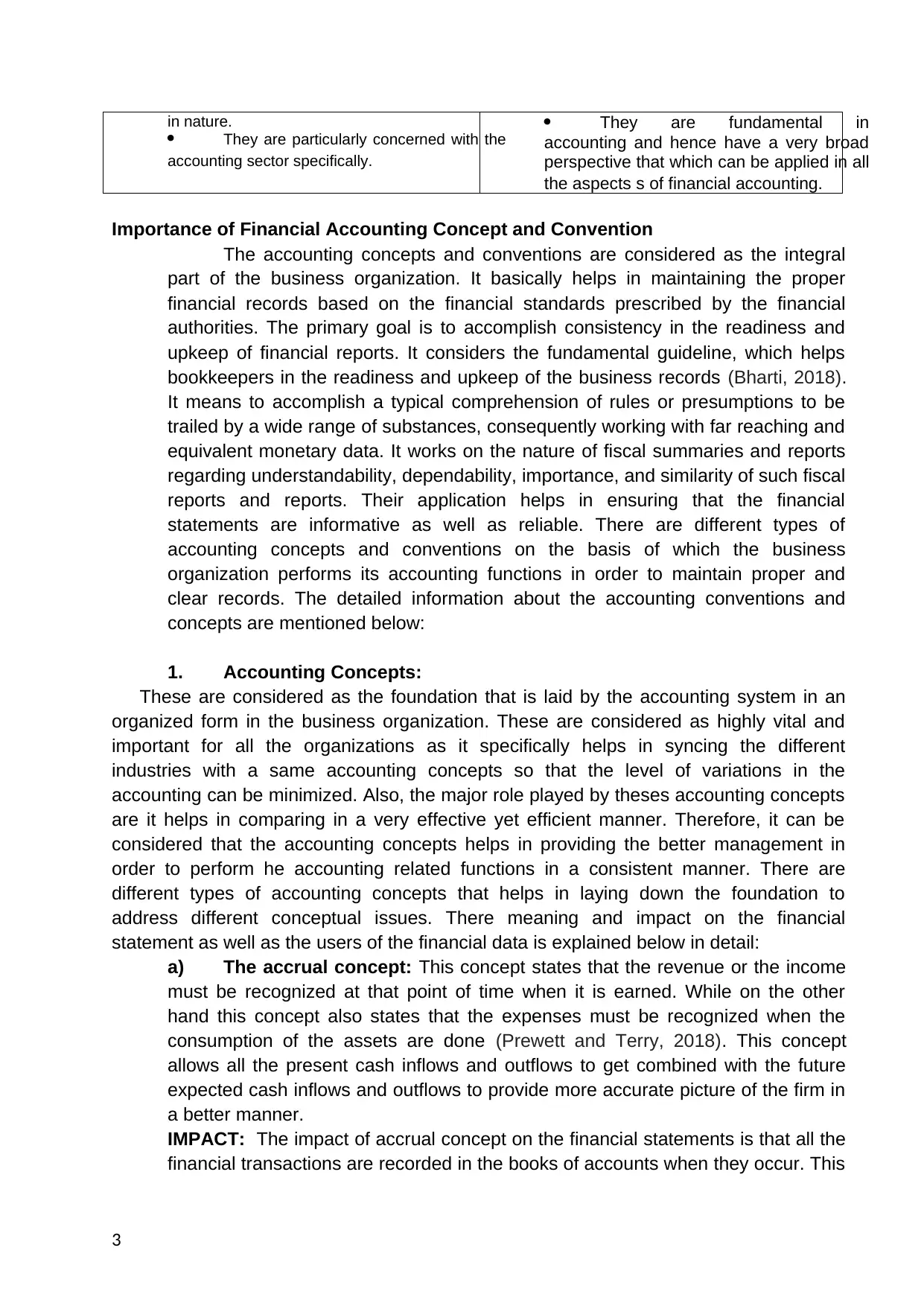
in nature.
They are particularly concerned with the
accounting sector specifically.
They are fundamental in
accounting and hence have a very broad
perspective that which can be applied in all
the aspects s of financial accounting.
Importance of Financial Accounting Concept and Convention
The accounting concepts and conventions are considered as the integral
part of the business organization. It basically helps in maintaining the proper
financial records based on the financial standards prescribed by the financial
authorities. The primary goal is to accomplish consistency in the readiness and
upkeep of financial reports. It considers the fundamental guideline, which helps
bookkeepers in the readiness and upkeep of the business records (Bharti, 2018).
It means to accomplish a typical comprehension of rules or presumptions to be
trailed by a wide range of substances, consequently working with far reaching and
equivalent monetary data. It works on the nature of fiscal summaries and reports
regarding understandability, dependability, importance, and similarity of such fiscal
reports and reports. Their application helps in ensuring that the financial
statements are informative as well as reliable. There are different types of
accounting concepts and conventions on the basis of which the business
organization performs its accounting functions in order to maintain proper and
clear records. The detailed information about the accounting conventions and
concepts are mentioned below:
1. Accounting Concepts:
These are considered as the foundation that is laid by the accounting system in an
organized form in the business organization. These are considered as highly vital and
important for all the organizations as it specifically helps in syncing the different
industries with a same accounting concepts so that the level of variations in the
accounting can be minimized. Also, the major role played by theses accounting concepts
are it helps in comparing in a very effective yet efficient manner. Therefore, it can be
considered that the accounting concepts helps in providing the better management in
order to perform he accounting related functions in a consistent manner. There are
different types of accounting concepts that helps in laying down the foundation to
address different conceptual issues. There meaning and impact on the financial
statement as well as the users of the financial data is explained below in detail:
a) The accrual concept: This concept states that the revenue or the income
must be recognized at that point of time when it is earned. While on the other
hand this concept also states that the expenses must be recognized when the
consumption of the assets are done (Prewett and Terry, 2018). This concept
allows all the present cash inflows and outflows to get combined with the future
expected cash inflows and outflows to provide more accurate picture of the firm in
a better manner.
IMPACT: The impact of accrual concept on the financial statements is that all the
financial transactions are recorded in the books of accounts when they occur. This
3
They are particularly concerned with the
accounting sector specifically.
They are fundamental in
accounting and hence have a very broad
perspective that which can be applied in all
the aspects s of financial accounting.
Importance of Financial Accounting Concept and Convention
The accounting concepts and conventions are considered as the integral
part of the business organization. It basically helps in maintaining the proper
financial records based on the financial standards prescribed by the financial
authorities. The primary goal is to accomplish consistency in the readiness and
upkeep of financial reports. It considers the fundamental guideline, which helps
bookkeepers in the readiness and upkeep of the business records (Bharti, 2018).
It means to accomplish a typical comprehension of rules or presumptions to be
trailed by a wide range of substances, consequently working with far reaching and
equivalent monetary data. It works on the nature of fiscal summaries and reports
regarding understandability, dependability, importance, and similarity of such fiscal
reports and reports. Their application helps in ensuring that the financial
statements are informative as well as reliable. There are different types of
accounting concepts and conventions on the basis of which the business
organization performs its accounting functions in order to maintain proper and
clear records. The detailed information about the accounting conventions and
concepts are mentioned below:
1. Accounting Concepts:
These are considered as the foundation that is laid by the accounting system in an
organized form in the business organization. These are considered as highly vital and
important for all the organizations as it specifically helps in syncing the different
industries with a same accounting concepts so that the level of variations in the
accounting can be minimized. Also, the major role played by theses accounting concepts
are it helps in comparing in a very effective yet efficient manner. Therefore, it can be
considered that the accounting concepts helps in providing the better management in
order to perform he accounting related functions in a consistent manner. There are
different types of accounting concepts that helps in laying down the foundation to
address different conceptual issues. There meaning and impact on the financial
statement as well as the users of the financial data is explained below in detail:
a) The accrual concept: This concept states that the revenue or the income
must be recognized at that point of time when it is earned. While on the other
hand this concept also states that the expenses must be recognized when the
consumption of the assets are done (Prewett and Terry, 2018). This concept
allows all the present cash inflows and outflows to get combined with the future
expected cash inflows and outflows to provide more accurate picture of the firm in
a better manner.
IMPACT: The impact of accrual concept on the financial statements is that all the
financial transactions are recorded in the books of accounts when they occur. This
3
⊘ This is a preview!⊘
Do you want full access?
Subscribe today to unlock all pages.

Trusted by 1+ million students worldwide
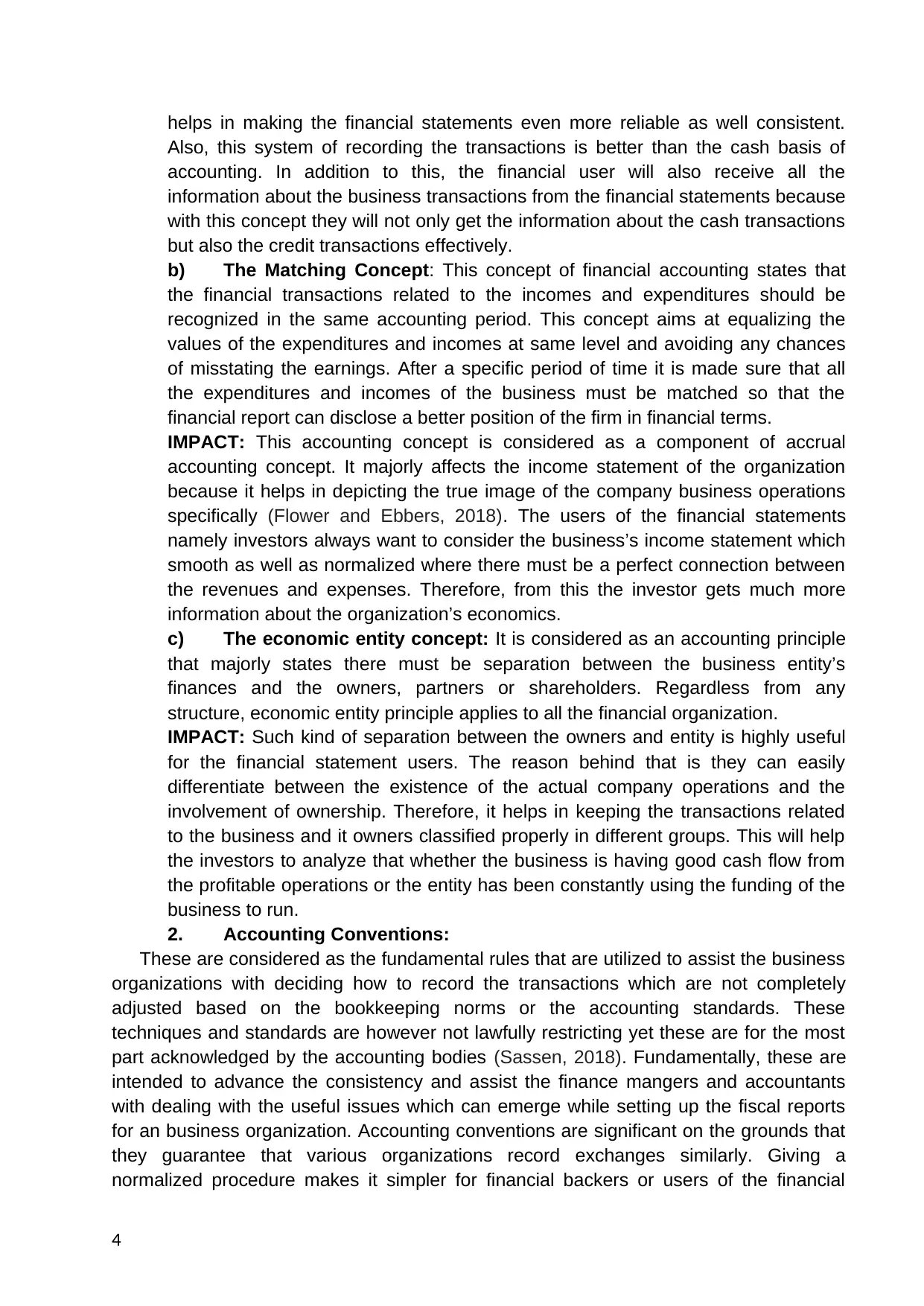
helps in making the financial statements even more reliable as well consistent.
Also, this system of recording the transactions is better than the cash basis of
accounting. In addition to this, the financial user will also receive all the
information about the business transactions from the financial statements because
with this concept they will not only get the information about the cash transactions
but also the credit transactions effectively.
b) The Matching Concept: This concept of financial accounting states that
the financial transactions related to the incomes and expenditures should be
recognized in the same accounting period. This concept aims at equalizing the
values of the expenditures and incomes at same level and avoiding any chances
of misstating the earnings. After a specific period of time it is made sure that all
the expenditures and incomes of the business must be matched so that the
financial report can disclose a better position of the firm in financial terms.
IMPACT: This accounting concept is considered as a component of accrual
accounting concept. It majorly affects the income statement of the organization
because it helps in depicting the true image of the company business operations
specifically (Flower and Ebbers, 2018). The users of the financial statements
namely investors always want to consider the business’s income statement which
smooth as well as normalized where there must be a perfect connection between
the revenues and expenses. Therefore, from this the investor gets much more
information about the organization’s economics.
c) The economic entity concept: It is considered as an accounting principle
that majorly states there must be separation between the business entity’s
finances and the owners, partners or shareholders. Regardless from any
structure, economic entity principle applies to all the financial organization.
IMPACT: Such kind of separation between the owners and entity is highly useful
for the financial statement users. The reason behind that is they can easily
differentiate between the existence of the actual company operations and the
involvement of ownership. Therefore, it helps in keeping the transactions related
to the business and it owners classified properly in different groups. This will help
the investors to analyze that whether the business is having good cash flow from
the profitable operations or the entity has been constantly using the funding of the
business to run.
2. Accounting Conventions:
These are considered as the fundamental rules that are utilized to assist the business
organizations with deciding how to record the transactions which are not completely
adjusted based on the bookkeeping norms or the accounting standards. These
techniques and standards are however not lawfully restricting yet these are for the most
part acknowledged by the accounting bodies (Sassen, 2018). Fundamentally, these are
intended to advance the consistency and assist the finance mangers and accountants
with dealing with the useful issues which can emerge while setting up the fiscal reports
for an business organization. Accounting conventions are significant on the grounds that
they guarantee that various organizations record exchanges similarly. Giving a
normalized procedure makes it simpler for financial backers or users of the financial
4
Also, this system of recording the transactions is better than the cash basis of
accounting. In addition to this, the financial user will also receive all the
information about the business transactions from the financial statements because
with this concept they will not only get the information about the cash transactions
but also the credit transactions effectively.
b) The Matching Concept: This concept of financial accounting states that
the financial transactions related to the incomes and expenditures should be
recognized in the same accounting period. This concept aims at equalizing the
values of the expenditures and incomes at same level and avoiding any chances
of misstating the earnings. After a specific period of time it is made sure that all
the expenditures and incomes of the business must be matched so that the
financial report can disclose a better position of the firm in financial terms.
IMPACT: This accounting concept is considered as a component of accrual
accounting concept. It majorly affects the income statement of the organization
because it helps in depicting the true image of the company business operations
specifically (Flower and Ebbers, 2018). The users of the financial statements
namely investors always want to consider the business’s income statement which
smooth as well as normalized where there must be a perfect connection between
the revenues and expenses. Therefore, from this the investor gets much more
information about the organization’s economics.
c) The economic entity concept: It is considered as an accounting principle
that majorly states there must be separation between the business entity’s
finances and the owners, partners or shareholders. Regardless from any
structure, economic entity principle applies to all the financial organization.
IMPACT: Such kind of separation between the owners and entity is highly useful
for the financial statement users. The reason behind that is they can easily
differentiate between the existence of the actual company operations and the
involvement of ownership. Therefore, it helps in keeping the transactions related
to the business and it owners classified properly in different groups. This will help
the investors to analyze that whether the business is having good cash flow from
the profitable operations or the entity has been constantly using the funding of the
business to run.
2. Accounting Conventions:
These are considered as the fundamental rules that are utilized to assist the business
organizations with deciding how to record the transactions which are not completely
adjusted based on the bookkeeping norms or the accounting standards. These
techniques and standards are however not lawfully restricting yet these are for the most
part acknowledged by the accounting bodies (Sassen, 2018). Fundamentally, these are
intended to advance the consistency and assist the finance mangers and accountants
with dealing with the useful issues which can emerge while setting up the fiscal reports
for an business organization. Accounting conventions are significant on the grounds that
they guarantee that various organizations record exchanges similarly. Giving a
normalized procedure makes it simpler for financial backers or users of the financial
4
Paraphrase This Document
Need a fresh take? Get an instant paraphrase of this document with our AI Paraphraser
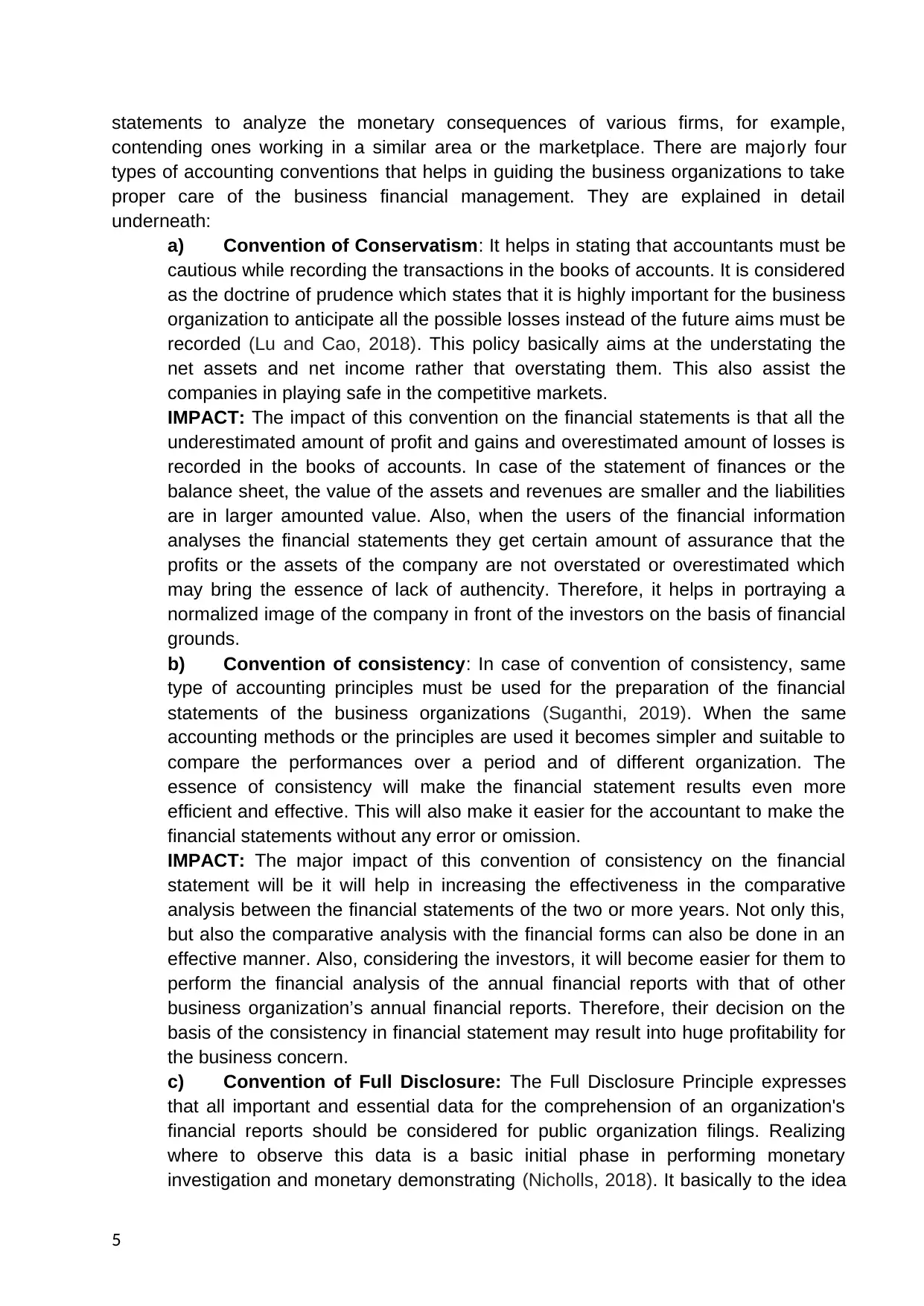
statements to analyze the monetary consequences of various firms, for example,
contending ones working in a similar area or the marketplace. There are majorly four
types of accounting conventions that helps in guiding the business organizations to take
proper care of the business financial management. They are explained in detail
underneath:
a) Convention of Conservatism: It helps in stating that accountants must be
cautious while recording the transactions in the books of accounts. It is considered
as the doctrine of prudence which states that it is highly important for the business
organization to anticipate all the possible losses instead of the future aims must be
recorded (Lu and Cao, 2018). This policy basically aims at the understating the
net assets and net income rather that overstating them. This also assist the
companies in playing safe in the competitive markets.
IMPACT: The impact of this convention on the financial statements is that all the
underestimated amount of profit and gains and overestimated amount of losses is
recorded in the books of accounts. In case of the statement of finances or the
balance sheet, the value of the assets and revenues are smaller and the liabilities
are in larger amounted value. Also, when the users of the financial information
analyses the financial statements they get certain amount of assurance that the
profits or the assets of the company are not overstated or overestimated which
may bring the essence of lack of authencity. Therefore, it helps in portraying a
normalized image of the company in front of the investors on the basis of financial
grounds.
b) Convention of consistency: In case of convention of consistency, same
type of accounting principles must be used for the preparation of the financial
statements of the business organizations (Suganthi, 2019). When the same
accounting methods or the principles are used it becomes simpler and suitable to
compare the performances over a period and of different organization. The
essence of consistency will make the financial statement results even more
efficient and effective. This will also make it easier for the accountant to make the
financial statements without any error or omission.
IMPACT: The major impact of this convention of consistency on the financial
statement will be it will help in increasing the effectiveness in the comparative
analysis between the financial statements of the two or more years. Not only this,
but also the comparative analysis with the financial forms can also be done in an
effective manner. Also, considering the investors, it will become easier for them to
perform the financial analysis of the annual financial reports with that of other
business organization’s annual financial reports. Therefore, their decision on the
basis of the consistency in financial statement may result into huge profitability for
the business concern.
c) Convention of Full Disclosure: The Full Disclosure Principle expresses
that all important and essential data for the comprehension of an organization's
financial reports should be considered for public organization filings. Realizing
where to observe this data is a basic initial phase in performing monetary
investigation and monetary demonstrating (Nicholls, 2018). It basically to the idea
5
contending ones working in a similar area or the marketplace. There are majorly four
types of accounting conventions that helps in guiding the business organizations to take
proper care of the business financial management. They are explained in detail
underneath:
a) Convention of Conservatism: It helps in stating that accountants must be
cautious while recording the transactions in the books of accounts. It is considered
as the doctrine of prudence which states that it is highly important for the business
organization to anticipate all the possible losses instead of the future aims must be
recorded (Lu and Cao, 2018). This policy basically aims at the understating the
net assets and net income rather that overstating them. This also assist the
companies in playing safe in the competitive markets.
IMPACT: The impact of this convention on the financial statements is that all the
underestimated amount of profit and gains and overestimated amount of losses is
recorded in the books of accounts. In case of the statement of finances or the
balance sheet, the value of the assets and revenues are smaller and the liabilities
are in larger amounted value. Also, when the users of the financial information
analyses the financial statements they get certain amount of assurance that the
profits or the assets of the company are not overstated or overestimated which
may bring the essence of lack of authencity. Therefore, it helps in portraying a
normalized image of the company in front of the investors on the basis of financial
grounds.
b) Convention of consistency: In case of convention of consistency, same
type of accounting principles must be used for the preparation of the financial
statements of the business organizations (Suganthi, 2019). When the same
accounting methods or the principles are used it becomes simpler and suitable to
compare the performances over a period and of different organization. The
essence of consistency will make the financial statement results even more
efficient and effective. This will also make it easier for the accountant to make the
financial statements without any error or omission.
IMPACT: The major impact of this convention of consistency on the financial
statement will be it will help in increasing the effectiveness in the comparative
analysis between the financial statements of the two or more years. Not only this,
but also the comparative analysis with the financial forms can also be done in an
effective manner. Also, considering the investors, it will become easier for them to
perform the financial analysis of the annual financial reports with that of other
business organization’s annual financial reports. Therefore, their decision on the
basis of the consistency in financial statement may result into huge profitability for
the business concern.
c) Convention of Full Disclosure: The Full Disclosure Principle expresses
that all important and essential data for the comprehension of an organization's
financial reports should be considered for public organization filings. Realizing
where to observe this data is a basic initial phase in performing monetary
investigation and monetary demonstrating (Nicholls, 2018). It basically to the idea
5
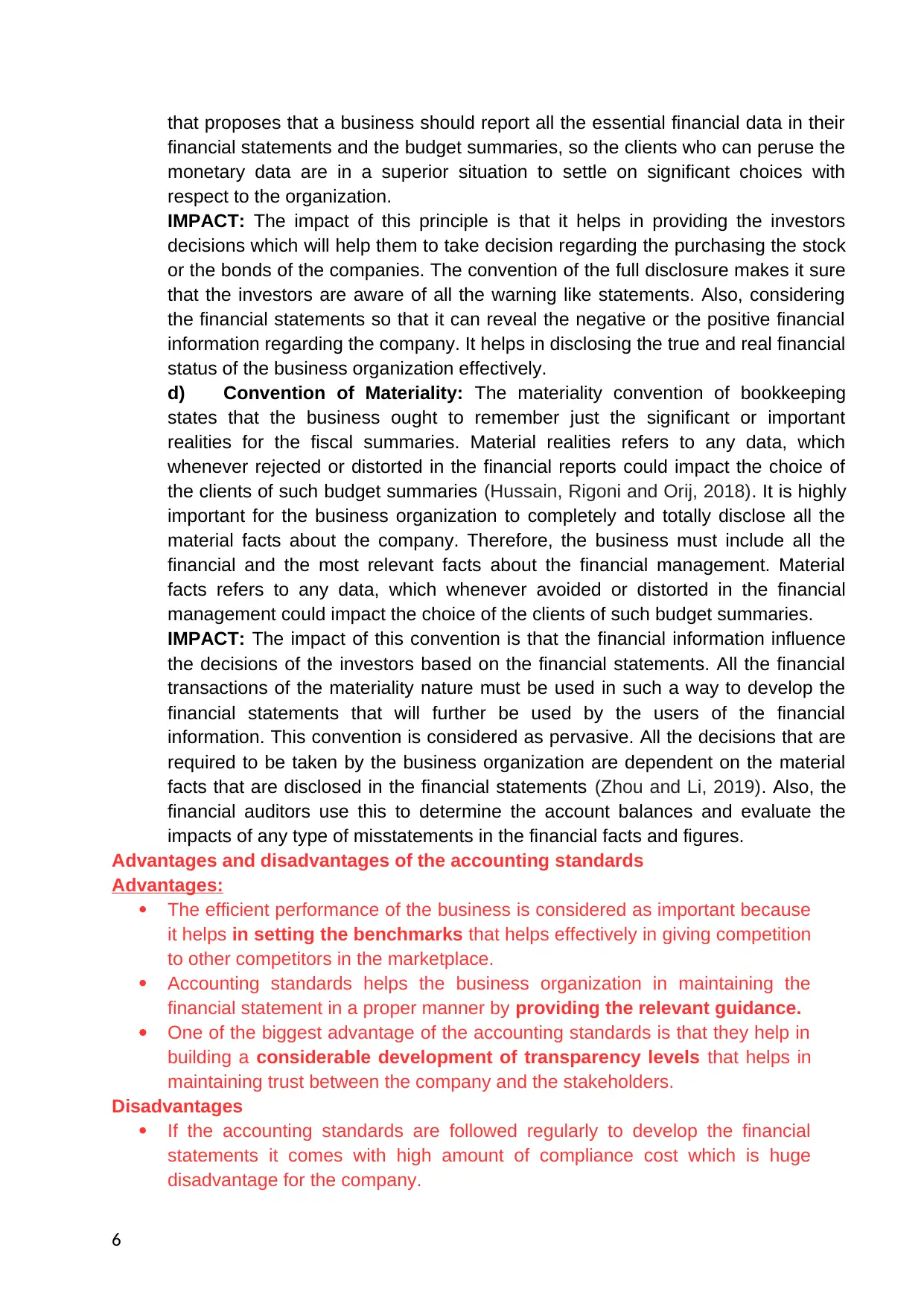
that proposes that a business should report all the essential financial data in their
financial statements and the budget summaries, so the clients who can peruse the
monetary data are in a superior situation to settle on significant choices with
respect to the organization.
IMPACT: The impact of this principle is that it helps in providing the investors
decisions which will help them to take decision regarding the purchasing the stock
or the bonds of the companies. The convention of the full disclosure makes it sure
that the investors are aware of all the warning like statements. Also, considering
the financial statements so that it can reveal the negative or the positive financial
information regarding the company. It helps in disclosing the true and real financial
status of the business organization effectively.
d) Convention of Materiality: The materiality convention of bookkeeping
states that the business ought to remember just the significant or important
realities for the fiscal summaries. Material realities refers to any data, which
whenever rejected or distorted in the financial reports could impact the choice of
the clients of such budget summaries (Hussain, Rigoni and Orij, 2018). It is highly
important for the business organization to completely and totally disclose all the
material facts about the company. Therefore, the business must include all the
financial and the most relevant facts about the financial management. Material
facts refers to any data, which whenever avoided or distorted in the financial
management could impact the choice of the clients of such budget summaries.
IMPACT: The impact of this convention is that the financial information influence
the decisions of the investors based on the financial statements. All the financial
transactions of the materiality nature must be used in such a way to develop the
financial statements that will further be used by the users of the financial
information. This convention is considered as pervasive. All the decisions that are
required to be taken by the business organization are dependent on the material
facts that are disclosed in the financial statements (Zhou and Li, 2019). Also, the
financial auditors use this to determine the account balances and evaluate the
impacts of any type of misstatements in the financial facts and figures.
Advantages and disadvantages of the accounting standards
Advantages:
The efficient performance of the business is considered as important because
it helps in setting the benchmarks that helps effectively in giving competition
to other competitors in the marketplace.
Accounting standards helps the business organization in maintaining the
financial statement in a proper manner by providing the relevant guidance.
One of the biggest advantage of the accounting standards is that they help in
building a considerable development of transparency levels that helps in
maintaining trust between the company and the stakeholders.
Disadvantages
If the accounting standards are followed regularly to develop the financial
statements it comes with high amount of compliance cost which is huge
disadvantage for the company.
6
financial statements and the budget summaries, so the clients who can peruse the
monetary data are in a superior situation to settle on significant choices with
respect to the organization.
IMPACT: The impact of this principle is that it helps in providing the investors
decisions which will help them to take decision regarding the purchasing the stock
or the bonds of the companies. The convention of the full disclosure makes it sure
that the investors are aware of all the warning like statements. Also, considering
the financial statements so that it can reveal the negative or the positive financial
information regarding the company. It helps in disclosing the true and real financial
status of the business organization effectively.
d) Convention of Materiality: The materiality convention of bookkeeping
states that the business ought to remember just the significant or important
realities for the fiscal summaries. Material realities refers to any data, which
whenever rejected or distorted in the financial reports could impact the choice of
the clients of such budget summaries (Hussain, Rigoni and Orij, 2018). It is highly
important for the business organization to completely and totally disclose all the
material facts about the company. Therefore, the business must include all the
financial and the most relevant facts about the financial management. Material
facts refers to any data, which whenever avoided or distorted in the financial
management could impact the choice of the clients of such budget summaries.
IMPACT: The impact of this convention is that the financial information influence
the decisions of the investors based on the financial statements. All the financial
transactions of the materiality nature must be used in such a way to develop the
financial statements that will further be used by the users of the financial
information. This convention is considered as pervasive. All the decisions that are
required to be taken by the business organization are dependent on the material
facts that are disclosed in the financial statements (Zhou and Li, 2019). Also, the
financial auditors use this to determine the account balances and evaluate the
impacts of any type of misstatements in the financial facts and figures.
Advantages and disadvantages of the accounting standards
Advantages:
The efficient performance of the business is considered as important because
it helps in setting the benchmarks that helps effectively in giving competition
to other competitors in the marketplace.
Accounting standards helps the business organization in maintaining the
financial statement in a proper manner by providing the relevant guidance.
One of the biggest advantage of the accounting standards is that they help in
building a considerable development of transparency levels that helps in
maintaining trust between the company and the stakeholders.
Disadvantages
If the accounting standards are followed regularly to develop the financial
statements it comes with high amount of compliance cost which is huge
disadvantage for the company.
6
⊘ This is a preview!⊘
Do you want full access?
Subscribe today to unlock all pages.

Trusted by 1+ million students worldwide
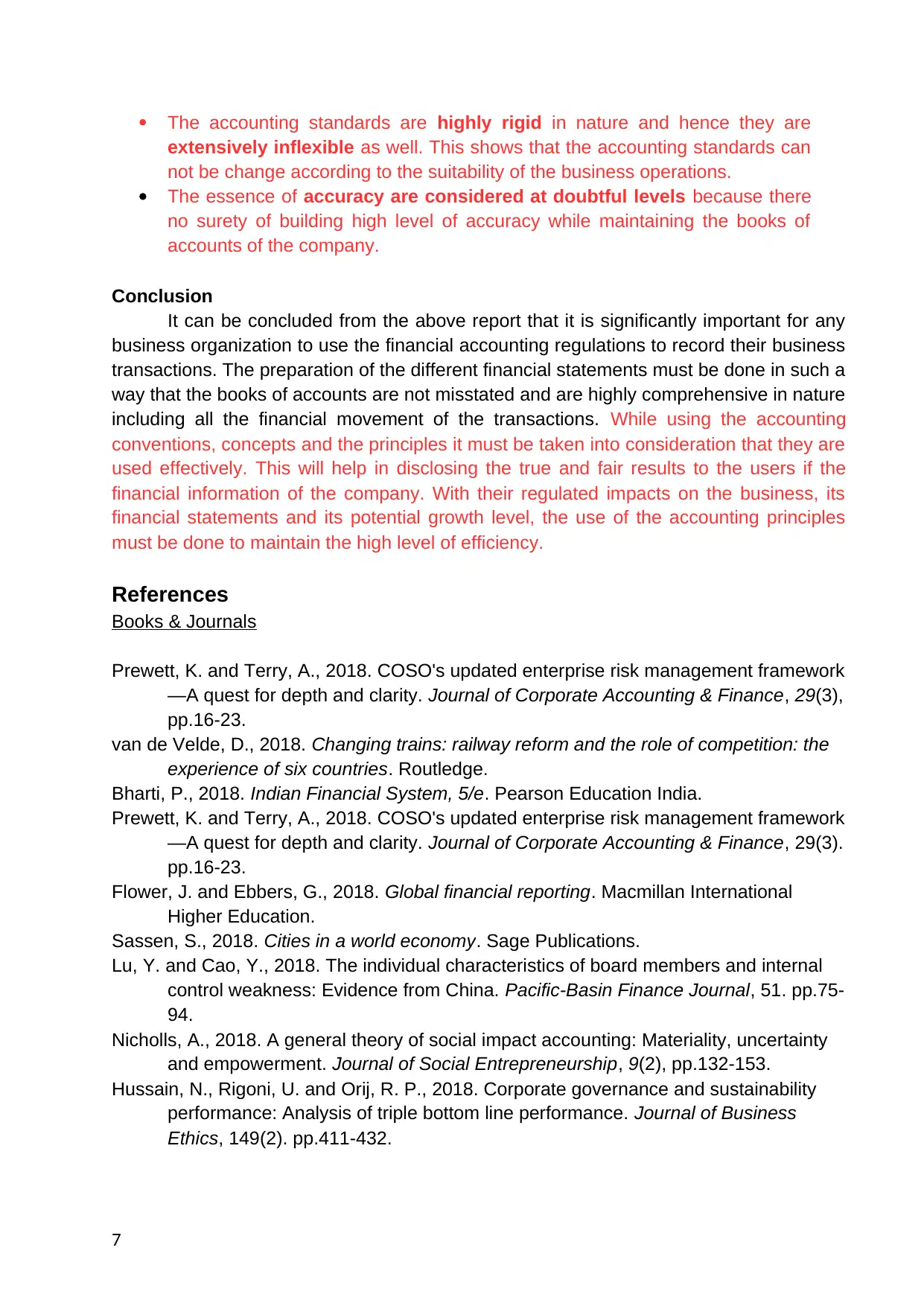
The accounting standards are highly rigid in nature and hence they are
extensively inflexible as well. This shows that the accounting standards can
not be change according to the suitability of the business operations.
The essence of accuracy are considered at doubtful levels because there
no surety of building high level of accuracy while maintaining the books of
accounts of the company.
Conclusion
It can be concluded from the above report that it is significantly important for any
business organization to use the financial accounting regulations to record their business
transactions. The preparation of the different financial statements must be done in such a
way that the books of accounts are not misstated and are highly comprehensive in nature
including all the financial movement of the transactions. While using the accounting
conventions, concepts and the principles it must be taken into consideration that they are
used effectively. This will help in disclosing the true and fair results to the users if the
financial information of the company. With their regulated impacts on the business, its
financial statements and its potential growth level, the use of the accounting principles
must be done to maintain the high level of efficiency.
References
Books & Journals
Prewett, K. and Terry, A., 2018. COSO's updated enterprise risk management framework
—A quest for depth and clarity. Journal of Corporate Accounting & Finance, 29(3),
pp.16-23.
van de Velde, D., 2018. Changing trains: railway reform and the role of competition: the
experience of six countries. Routledge.
Bharti, P., 2018. Indian Financial System, 5/e. Pearson Education India.
Prewett, K. and Terry, A., 2018. COSO's updated enterprise risk management framework
—A quest for depth and clarity. Journal of Corporate Accounting & Finance, 29(3).
pp.16-23.
Flower, J. and Ebbers, G., 2018. Global financial reporting. Macmillan International
Higher Education.
Sassen, S., 2018. Cities in a world economy. Sage Publications.
Lu, Y. and Cao, Y., 2018. The individual characteristics of board members and internal
control weakness: Evidence from China. Pacific-Basin Finance Journal, 51. pp.75-
94.
Nicholls, A., 2018. A general theory of social impact accounting: Materiality, uncertainty
and empowerment. Journal of Social Entrepreneurship, 9(2), pp.132-153.
Hussain, N., Rigoni, U. and Orij, R. P., 2018. Corporate governance and sustainability
performance: Analysis of triple bottom line performance. Journal of Business
Ethics, 149(2). pp.411-432.
7
extensively inflexible as well. This shows that the accounting standards can
not be change according to the suitability of the business operations.
The essence of accuracy are considered at doubtful levels because there
no surety of building high level of accuracy while maintaining the books of
accounts of the company.
Conclusion
It can be concluded from the above report that it is significantly important for any
business organization to use the financial accounting regulations to record their business
transactions. The preparation of the different financial statements must be done in such a
way that the books of accounts are not misstated and are highly comprehensive in nature
including all the financial movement of the transactions. While using the accounting
conventions, concepts and the principles it must be taken into consideration that they are
used effectively. This will help in disclosing the true and fair results to the users if the
financial information of the company. With their regulated impacts on the business, its
financial statements and its potential growth level, the use of the accounting principles
must be done to maintain the high level of efficiency.
References
Books & Journals
Prewett, K. and Terry, A., 2018. COSO's updated enterprise risk management framework
—A quest for depth and clarity. Journal of Corporate Accounting & Finance, 29(3),
pp.16-23.
van de Velde, D., 2018. Changing trains: railway reform and the role of competition: the
experience of six countries. Routledge.
Bharti, P., 2018. Indian Financial System, 5/e. Pearson Education India.
Prewett, K. and Terry, A., 2018. COSO's updated enterprise risk management framework
—A quest for depth and clarity. Journal of Corporate Accounting & Finance, 29(3).
pp.16-23.
Flower, J. and Ebbers, G., 2018. Global financial reporting. Macmillan International
Higher Education.
Sassen, S., 2018. Cities in a world economy. Sage Publications.
Lu, Y. and Cao, Y., 2018. The individual characteristics of board members and internal
control weakness: Evidence from China. Pacific-Basin Finance Journal, 51. pp.75-
94.
Nicholls, A., 2018. A general theory of social impact accounting: Materiality, uncertainty
and empowerment. Journal of Social Entrepreneurship, 9(2), pp.132-153.
Hussain, N., Rigoni, U. and Orij, R. P., 2018. Corporate governance and sustainability
performance: Analysis of triple bottom line performance. Journal of Business
Ethics, 149(2). pp.411-432.
7
Paraphrase This Document
Need a fresh take? Get an instant paraphrase of this document with our AI Paraphraser
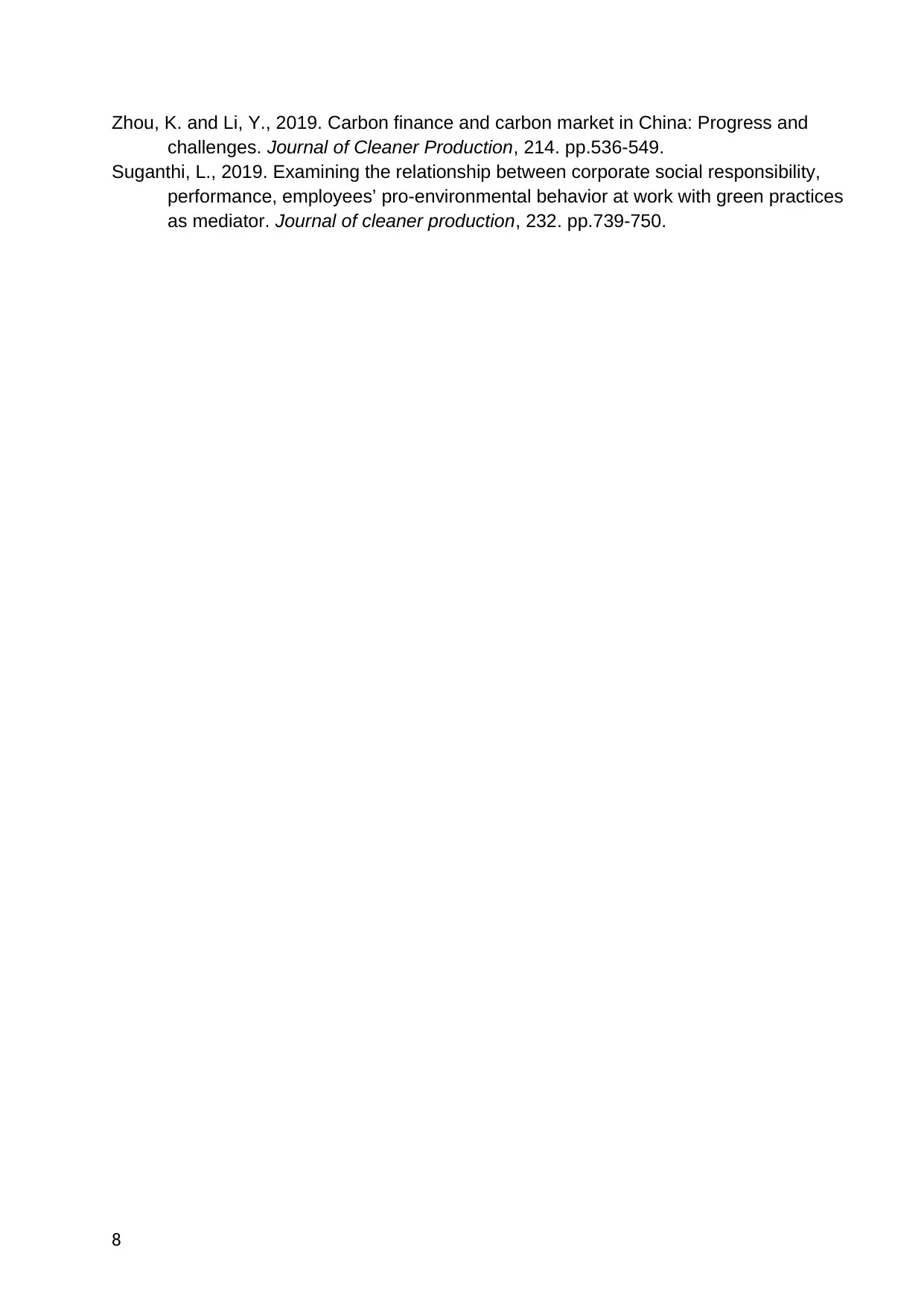
Zhou, K. and Li, Y., 2019. Carbon finance and carbon market in China: Progress and
challenges. Journal of Cleaner Production, 214. pp.536-549.
Suganthi, L., 2019. Examining the relationship between corporate social responsibility,
performance, employees’ pro-environmental behavior at work with green practices
as mediator. Journal of cleaner production, 232. pp.739-750.
8
challenges. Journal of Cleaner Production, 214. pp.536-549.
Suganthi, L., 2019. Examining the relationship between corporate social responsibility,
performance, employees’ pro-environmental behavior at work with green practices
as mediator. Journal of cleaner production, 232. pp.739-750.
8
1 out of 8
Related Documents
Your All-in-One AI-Powered Toolkit for Academic Success.
+13062052269
info@desklib.com
Available 24*7 on WhatsApp / Email
![[object Object]](/_next/static/media/star-bottom.7253800d.svg)
Unlock your academic potential
Copyright © 2020–2026 A2Z Services. All Rights Reserved. Developed and managed by ZUCOL.



